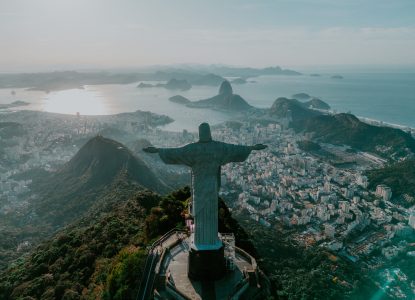The G20 Interfaith Forum, which has convened diverse religious actors inspired by the G20 agendas since 2014,[1] looks forward to Brazil’s G20 Presidency in 2024. Through convenings in different world regions, dialogue, and analytic work, the Forum aims to contribute to the G20 process, bringing the wisdom, experience, and prophetic voice of diverse religious communities alongside other global constituencies.
Brazil’s G20 Presidency in 2024 and the G20 Interfaith Forum
A centerpiece of G20 Interfaith Forum plans is a culminating meeting in Brasilia, tentatively during the week of August 19-23, 2024, though the possibility of later timing is being explored. The convening would focus on issues identified in preparatory meetings held in Brazil and other global settings during 2023-2024, drawing on the Forum’s extensive experience, dialogue, and analysis since 2014.
The Forum’s central focus is urgent calls to action to support the world’s most vulnerable communities, who face challenges including poverty, inequality, discrimination, armed conflict, forced migration and displacement, the continuing impact of the global COVID-19 emergencies, and disruptions linked to climate change. The aim is to advance practical action paths towards just and realistic hope and action for a better future in confronting the pressing challenges of current times.

Inviting the Voice of Faith to the Table
The August Interfaith Forum (which is seen as an integral part of the Brazilian G20 program), would convene deeply engaged leaders and focus on religious dimensions of global debates and the G20 agenda, especially as set out by the Brazilian government. The meeting would address wide-ranging issues, from current socio-economic crises to the Sustainable Development Goals (SDGs), highlighting potential collaborative action in a G20 context.
The world’s religious communities engage in countless ways on the issues that form the global agenda. The G20 Interfaith Forum, part of this growing constellation of formal and informal groups centered on the G20, has established an internationally recognized platform and organization that works in supportive ways with successive host countries to identify concerns and priorities within religious communities. Its members, who constitute a “network of networks” of institutions engaged on global agendas, is religiously and geographically diverse, bringing together actors engaged in a wide range of global issues. The IF20’s international record extends over the past decade and its role is increasingly known and respected. It offers a platform for religious leaders, representatives of faith-based and faith-inspired organizations, government officials, international organizations and civil society, and academics with relevant expertise, to come together to share experiences and develop concrete practical recommendations. Proposals that emerge form the basis for global advocacy efforts aimed at contributing to formulation and implementations of G20 agendas. IF20 action is financed by diverse international sources.
Issues to be Addressed
As in prior years, the IF20 will focus on analytic work and proposal development by relevant groups that develop and review G20 agendas and action. A series of webinars, meetings in different world regions, and participation in parallel events and efforts are planned. Past areas of focus and continuing IF20 concern include:
- Child welfare
- Trafficking and modern forms of slavery
- The plight of refugees and displaced persons
- Continuing COVID recovery issues, including, pandemic preparedness, health system reform, and mitigating COVID-related education short falls
- Religious engagement on food security and other social protection priorities
- Education reforms to address social cohesion
- Action to address racism and discrimination
- Interfaith action to protect rainforests
- Action on climate change including climate finance
- Religious engagement on women’s empowerment
- Artificial intelligence challenges
- Rights of indigenous peoples and religious minorities
- Fair and equitable tax system for funding social investments
Preliminary plans for 2024 and the August Brasilia Forum are inspired by the priorities of the Brazil G20 presidency. They focus on specific actions that religious communities and actors can take to address topics of global concern, including peacebuilding and conflict resolution, global economic architecture (including action on country indebtedness), measures to address food insecurity, and action on climate change. The overarching theme is action that addresses priority needs of the world’s most vulnerable people and communities.
Forum Attendance and Leadership
The Brasilia Forum would be attended by 200-300 participants, from Brazil and internationally, including and government representatives, international organizations, civil society, academia, and faith communities. The aim is an inclusive, diverse audience, representative insofar as possible of global populations. A larger audience is expected to follow the event online, with multi-channel simultaneous interpretation.
Professor Rodrigo Vitorino Souza Alves, head of the Brazilian Center for Studies in Law and Religion at the Federal University of Uberlandia, has agreed to chair the local organizing committee.
About the G20 Interfaith Forum
The G20 Interfaith Forum was launched in 2014, under Australia’s G20 Presidency. It has progressed from a largely academic gathering timed to coincide with the G20 Summit to a sustained alliance of diverse religious leaders, practitioners from humanitarian, peacebuilding, and development organizations; and scholars. The underlying purpose is to contribute to and help to shape global agendas through practical and ethical experience and wisdom of the world’s diverse religious communities., which are often absent from global forums. The extensive contributions of the “network of networks” as well as the prophetic voice and leadership of renowned religious leaders can enrich the G20 deliberations and contribute, alongside parallel and often interlinked constituencies (civil society, youth, business, etc.) to addressing the urgent problems facing the world and its leaders. For more detailed information about the G20 Interfaith Forum, see the organization’s website at www.g20interfaith.org.
[1] See Katherine Marshall, The G20 Interfaith Forum Journey, G20 Interfaith Forum Viewpoints, https://blog.g20interfaith.org/2023/06/08/the-g20-interfaith-forum-journey/.


